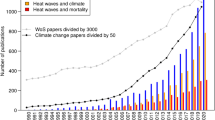Creating the world we want is a subtle but more powerful mode of operation than destroying the world we do not want
Marianne Williamson
Abstract
Climate is one of the more complex physical systems in nature, its behaviour being fundamentally non-linear and chaotic. In assessing the potential risks from climate change and the costs of averting it, researchers and policymakers encounter pervasive uncertainty. Sceptics demand to get rid of the inherent uncertainties, and some experts, on the other end, keep sending out messages of catastrophic scenarios hoping that this will increase people’s awareness of the danger we face. The recent admission of a mistake in IPCC’s Climate change 2007 report (promptly broadcast by all the major media groups and newspapers from Jan. 20th 2010 onwards) made by the head of the Intergovernmental Panel on Climate Change—that Himalayan glaciers could melt away by 2035 (the IPCC claim of 2035 is wrong by over 300 years.)—has already brought a damage to the IPCC’s reputation that is likely to be considerable. But in this paper, perhaps risking being provocative and paradoxical, instead of looking for the right answers to what we think are inevitable uncertainties, we intend to search for new questions that may lead to a new way of thinking and may bring about new lifestyles and behaviour for citizens and firms.
Similar content being viewed by others
Notes
It is important to say that this mistake was found not by sceptics, but by a few of the scientists themselves, including one who is an IPCC co-author.
Carbon footprint: the amount (expressed in units of CO2 equivalents) of greenhouse gases that enter the atmosphere as a result of a given activity or product.
Carbon offset: the counterbalancing of emissions via actions that reduce emissions elsewhere from where they are produced.
References
Ashton, J. (2009). Keynote speech Copenhagen climate congress, March 10, 2009 http://ukindenmark.fco.gov.uk/resources/en/pdf/pdf2/Copenhagenspeech_doc.
Ashton, J. (2010). The politics of the low carbon transition, Feb 22–23, Greenhouse gases in the Earth system: Setting the agenda to 2030. London, UK: The Royal Society.
Bauman, Z. (1993). Postmodern ethics. UK: Oxford Blackwell Pub.
Bauman, Z. (2000). Liquid modernity. UK: Cambridge Polity press.
Bauman, Z. (2002). Society under siege. UK: Cambridge Polity press.
CBO (Congressional Budget Office) paper. (2005). Uncertainty in analyzing climate change: Policy implications, the congress of the United States, http://www.cbo.gov/ftpdocs/60xx/doc6061/01-24-ClimateChange.pdf.
Dembo, R., & Davidson, E. (2007). Everything you wanted to know about offsetting but were afraid to ask. USA: A Zerofootprint Publication.
Fedorschak, V. J. (1999). The shadow on the path. USA: Hohm Press.
Gladwell, M. (2001). The tipping point. USA: Back Bay international edition.
Gregory, J., & Huybrechts, P. (2006). Ice sheet contributions to future sea level change. Philosophical Transactions of the Royal Society of London Series A, 364, 1709–1731.
IPCC. (2007). Summary for policymakers. In M. L. Parry, O. F. Canziani, J. P. Palutikof, P. J. van der Linden, & C. E. Hanson (Eds.), Climate change 2007: Impacts, adaptation and vulnerability. Contribution of working group II to the fourth assessment report of the intergovernmental panel on climate change (pp. 7–22). Cambridge: Cambridge University Press.
Jackson, T. (2005). Motivating sustainable consumption—A review of evidence on consumer behaviour and behavioural change. Surrey UK: Report Centre for Environmental Strategy.
Kuhn, T. (1962). The structure of scientific revolutions. Chicago, USA: University of Chicago Press.
Kühtz, S. (2007). Adoption of sustainable development schemes and behaviours in Italy: Barriers and solutions—What can educators do? International Journal of Sustainability for Higher Education, 8(2), 155–169.
Kühtz, S. (2008). Ecologia e pace: Che posso fare io? Rubrica Piano B-futuro e possibilità per una cultura eco-compatibile, Ilturismoculturale. Lucianovannieditore, 3(8), 132–133. (in Italian).
Kühtz, S. (2009). Carbon footprint assessment: A tool for promoting long-term pollution emission reduction and sustainable development? In H. Newbury & W. De Lorne (Eds.), Industrial pollution including oil spills (Chapter 7). USA: Nova Science Publishers, Inc.
Nordhaus, W. D., & Boyer, J. (2000). Warming the world: Economic models of global warming. Cambridge, USA: MIT Press.
Sen, A. (2000). Development as freedom. New York, USA: Anchor Books.
Smith, J. (2003). Redesign of government sustainability education programs for business personnel: From awareness raising to changing behaviour. Ph.D. thesis, University of New England, Armidale.
UNESCO 2000. World education report.
Walker, G., & King, D. (2008). The hot topic. London, UK: Bloomsbury Publishing.
Acknowledgments
The author wishes to thank Lorenzo Gallinari (G&G consulting) for the invaluable contribution and insightful discussions on the matter without which this article could not have been written.
Author information
Authors and Affiliations
Corresponding author
Additional information
Readers should send their comments on this paper to BhaskarNath@aol.com within 3-months of publication of this issue.
Rights and permissions
About this article
Cite this article
Kuhtz, S. Challenges posed by climate change: is environmental protection an ethical issue?. Environ Dev Sustain 13, 79–85 (2011). https://doi.org/10.1007/s10668-010-9249-5
Received:
Accepted:
Published:
Issue Date:
DOI: https://doi.org/10.1007/s10668-010-9249-5




